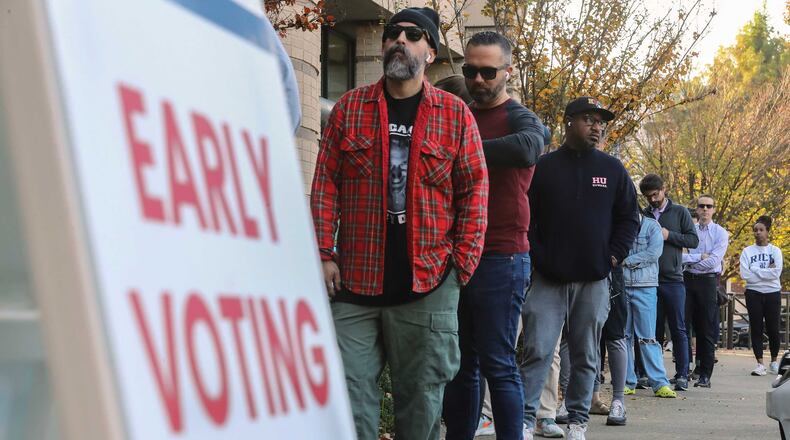A federal judge in Atlanta temporarily blocked two provisions of Georgia election law but upheld two others in orders issued Friday.
U.S. District Judge J.P. Boulee granted a preliminary injunction blocking election officials from imposing criminal penalties for violating a ban on food, drinks and other gifts to voters at the outer perimeter of voting lines. He also granted a preliminary injunction blocking counties from rejecting the ballots of voters who do not write their proper date of birth on their absentee ballot envelopes.
But Boulee rejected preliminary injunctions prohibiting unauthorized people from returning absentee ballots for another person and general restrictions on the location and hours of operation of ballot drop boxes.
The litigation continues, and the judge must still make final determinations on the issues. But Friday’s rulings signal that some provisions of Georgia’s sweeping 2021 election law may eventually be overturned.
Both sides of the debate declared partial victory.
“The court recognized that voters should not be disenfranchised for forgetting to write their birthdate on their absentee ballot envelope, or arrested for offering food or drink to voters in line outside the 150-foot zone around polling locations,” said Rahul Garabadu, senior voting rights staff attorney at the ACLU of Georgia.
Secretary of State Brad Raffensperger said: “I am glad that the court upheld Georgia’s commonsense rules banning ballot harvesting and securing absentee ballot drop boxes. Georgia’s voting system is accessible to all voters, with multiple options for voters to choose how they want to exercise their right to vote.”
The General Assembly passed Senate Bill 202 in the wake of former President Donald Trump’s false accusations that the 2020 presidential election was rife with fraud. Among other things, the bill restricted the number and placement of ballot drop boxes, changed voter identification requirements and approved earlier absentee ballot deadlines.
Voting rights advocates filed numerous lawsuits against state and local officials challenging the law, saying it infringed on federally protected voting rights. The lawsuits have been largely unsuccessful. But Friday’s rulings in a lawsuit brought by numerous plaintiffs gave them two preliminary victories.
SB 202 prohibits the provision of food, drink and gifts within 150 feet of the outer edge of any building with a polling place (an area dubbed the “buffer zone”) and within 25 feet of any voter standing in line at any polling place, no matter how far from the polling place (called the “supplemental zone”).
Boulee previously upheld the 150-foot buffer zone. But on Friday he ruled against the 25-foot supplemental zone, noting it fluctuated based on the location of voters and had “no fixed line of demarcation and no limit.”
He cited a Supreme Court precedent that found that such restrictions become unconstitutional “at some measurable distance from the polls.” And he found the zone could infringe on the First Amendment speech and expression rights of groups that wanted to provide food, drink and gifts to voters.
The judge also granted a preliminary injunction blocking counties from rejecting absentee ballots if voters fail to print their proper date of birth on the outer envelope.
He found the requirement to be immaterial to determining whether a voter is qualified to vote. Voter qualifications are determined before the ballot is even issued, he noted. And voters are already required to provide their Social Security and driver’s license or state ID numbers on the envelope to prove their identity.
Boulee rejected preliminary injunctions against restrictions on ballot drop boxes and the return of absentee ballots.
State law requires drop boxes to be inside existing polling places and restricts them to regular polling place hours. It also says ballots can only be returned by a voter or their family member, household member or caregiver.
The plaintiffs said those restrictions illegally impede the ability of disabled people to vote. Boulee ruled Georgia still provides “meaningful access” to voting to the disabled.
About the Author
Keep Reading
The Latest
Featured




